“There are strange things done in the land of the midnight sun by the men who fish for trout;
The Arctic trails have their secret tales that would make your blood run out;
The Northern Lights have seen strange sights, but the strangest they ever did see
was the night on the marge of the Bearclaw Lodge, I shot some imagery.”
My apologizes to Robert Service
Thus begins my adventures of “wild” Alaska . . .
And, for me, that statement holds true. I have surpassed anything that I thought I was capable of accomplishing. I flew to Alaska Trophy Adventures on a very small plane, landed above the lodge on a homemade landing strip. I rode Cat 3 rapids up and down a raging river, hiked in several miles through current laden streams to photograph the Coastal Brown Bears. And, I flew out on a floatplane from one of the more remote areas of Southwestern Alaska, in Katmai National Park.
I spent three days photographing along the Alagnak Wild River, a river rich in cultural history, physical beauty, and natural resources, spawning a diverse population of fish and wildlife, about 79 miles long spilling into Bristol Bay, in southwestern Alaska. This river is managed by the National Park Service according to the provisions of the National Wild and Scenic Rivers Act of 1968.
Its spawning time for the Sockeyes and the Silvers so where the salmon are so are the coastal brown bears and so are the fly fishermen, and one in particular, Jim Heimer.
We landed in King Salmon amist a fog that had rolled in from Bristol Bay. Charlie, owner of Alaskan Trophy Adventures, arrived to pick us up and fly us across the terra nova tundra of Katmai National Park in his very small plane. When I saw the plane (not a float plane), I immediately asked him how we were going to land. With a twinkle in his eye and a big grin, he replied that he had a small “airport” behind his lodge. Oh, okay . . . but how many pounds can this plane hold . . . 900 lbs. Let’s just say that between Jim, Charlie and I plus the luggage, we would be cutting it close. For all my anxiety, it was a pleasant jot to Alaskan Trophy Adventures. An eco-friendly sustainable lodge that is located on scenic Alagnak River in Katmai National Park.
We were assigned to the VIP cabin with an ATV as transportation to and from the main lodge area. It’s the poster child for remote wildness. They told us to shout, “Go Away Bear” when we left the cabin just in case a bear was lurking nearby or on the deck! However, the two very large English (special breed) yellow Labs, named Winston and Kodiak, were the official canine alarm system. They would bark when bears or wolves were in the vicinity.
There was an international crowd at the lodge, most for bear viewing. The guy from Pakistan and Jim were the only ones fly fishing. I met two other photogs, which, like myself, where there to photograph the bears. Claudia, Arla and I had interesting conversations every night around cocktails and dinner mostly centered on photography. I enjoyed their company both in the field as well as at breakfast and dinner.
First Day on the River
I went out with John Hyde, a professional photographer from Juneau, and our guide in a small jet-powered boat. We explored the Alagnak downstream just letting the current carry us through a meandering maze of rocks, rapids, calm waters, and shallows in search of the Coastal Brown Bear, Ursus arctos horribilis. Brown bears found inland and in mountainous habitats are called “grizzlies” while brown bears living in coastal areas are called coastal brown bears. Often you hear brown bears called “Kodiak” bears, which are a subspecies of the brown bear and isolated to Kodiak Island in Alaska. Because of the abundance of food available in the coastal areas, the coastal brown bears are much larger in size than a grizzly.
Our only bear viewing that day was a large male making his way across the tundra. We spotted the bear crossing as we made the bend in the river coming upstream. Of course the bear scambled up the 15 foot embankment with ease as soon as he made landfall. John and the guide, slipping and sliding up the embankment (it had rained the night before), managed to follow the bear. They asked if I wanted to come and I declined after seeing the struggle that John went through. However, as I sat in the boat, with it tied to a tree trunk, and the current keeping a tight grip on the rope, I thought of a safety issue that might present itself . . . how would I drive the boat if it broke its anchor? But a more dire consequences went running through my head when I thought of the movie, “Grizzly,” where the bear doubled back. No that wouldn’t happen! Attacked by a bear or stuck in a runaway boat down a raging river with big boulders in the pathway.
Bald Eagles
We did encounter several bald eagles, Haliaeetus leucocephalus. This bird, as it soared in the sky above, made me realize just what defines this majestic symbol of the United States. The bald eagle represents freedom, and in wild Alaska, the last frontier, you can truly experience that freedom.
In the early morning hours at one of the first battles of the Revolution, the noise of war awoke the bald eagles. They flew from their nests, circling high above and crying out over the heads of the men that were fighting. “The eagles are shrieking for freedom,” shouted the patriots.
Hitting the Mother Lode
It took about an hour up a raging wild river through a large canyon, to Lake Kukaklek. Our destination was a small river with swift water running through it, and loaded with sockeye salmon. Where the salmon spawn is where the bears are.
Getting there was another story . . . the Alegnak Wild River canyon narrows, which produce Cat 3 rapids. And, according to our guide, Patrick, it can be quite dangerous without a jet-powered boat to navigate around the large boulders just below the surface. But, more important, you need an experienced river runner, like Patrick, who knows the most dangerous spots in the river and how to maneuver through the rapids. One concern of Patrick’s is a formidable glare caused by the water and the position of the sun in the late afternoon. It renders the boulders almost invisible. So it was always imperative that we made our way back to the lodge by mid afternoon.
We anchored the boat and made our way upstream, fighting the current on foot, carrying tripods and camera equipment through the braided headwaters of a small river, appropriate named, “Bear River.” Well, that’s what the owner of Alaska Trophy Adventures called it.
As I rounded the bend in a meandering elbow, my excitement abated into fear when first my eyes laid on several large brown bears fishing for sockeye salmon not more than 60 feet away.
We shot on a small island for a few hours while the bears made their way fishing upstream and downstream, occasionally stopping to watch us and sniffing the air. Light became too harsh so we decided to move upstream to get a better angle and better light. Of course moving upstream meant sharing the water with a 900 lb brown bear. The idea is to move slowly and quietly, well as quietly as you can, albeit in fishing waders and “Frankenstein” boots against a strong current (does make for a good workout though) with a river bottom littered in an assortment of various sized rocks. We found a great spot—setting up tripods in water, mounting the 500mm lens, and firing away. We used the riverbank to support our “rear ends.” Of course, it was a little daunting to have our backs to the bear trails.
As we headed back to the boat, we had a slightly scary incident when a “teenage” brown bear stopped fishing, stood on his hind legs, sniffing the air and throwing his jowls around all the while staring us down. The guide quietly had us stop, bunch together, and look straight at the bear. I thought what an opportunity to get the bear in a threat posture standing up. Just as I pulled my camera, ever so slowly, into the shooting mode, the guide told me to “stand down.” So for several frightful moments we had the infamous standoff at the “OK Corral.” But out of the corner of his eye, Mr. Bear saw a nice salmon and went back to fishing. He figured it was much more tasty than a bunch of odd shaped things in Frankenstein boots.
Side Note: the check mark is NOT a link to a “missed/loss” shot but a count of how many lost opportunities of great shots.
An Encounter with Mother Grizzly and her Two Cubs
The highlight of the trip— mother bear proudly allowed us to spend time with her cubs. It was amazing to watch her fish while her clubs played and slept nearby. She watched us with caution but still continued to fish right in front of us. I couldn’t believe just how close we were to the sow. In most cases, we were only about 30-50 feet away.
She watches the river from an advantage point on the bank. When she spotted her prey, she pounced in with a large leap in a thunderous splash of water and foam, for the death grip with the salmon firmly in her teeth.
Our guides, who were armed, told us that this was the first time she allowed her cubs out when humans were around.
Because of the abundance of food, the bears do not seem to mind the present of humans. However, they are the largest land based predator of North America so it goes without saying that there are rules to follow . . . strict rules for photographing bears on the border of Katmai National Park.
Bearclaw Lodge on the Aleknagik
I apologize for reversing my timeline but I did come to Alaska to shoot bears . . .
In the first lag of our journey, we stayed at  Bearclaw Lodge, located on the shores of Aleknagik Lake, near Dillingham, Alaska. While Jim fished the headwaters of Aleknagik Lake, I photographed wildlife, fish, and eagles. Well, mostly fish so Jim could show his proud catch.
Bearclaw Lodge, located on the shores of Aleknagik Lake, near Dillingham, Alaska. While Jim fished the headwaters of Aleknagik Lake, I photographed wildlife, fish, and eagles. Well, mostly fish so Jim could show his proud catch.
Formed by glaciers, Aleknagik Lake and several other lakes in the Bristol Bay watershed, is the spawning ground of the world’s largest population of sockeyes. We were surrounded by forested landscapes, cone-shaped mountains, and windswept tundra across miles of rivers and tributaries.
Our last day, Jim fished a place called “sunshine valley” in the northernmost part of this glacier fed lake. We encountered a harbor seal so far off course . . . 75 miles off course. Our guide told us it was unusual to sight a seal this far inland. I spent about an hour shooting the seal, and we had to be cagey, with stealth moves to get as close as possible. Staying behind the guide, the two of us crept up ever so slowly when the seal turned his head.
All and all, some 4000 pictures later, I was blessed with the ability to photographed one of the most beautiful places in the world with its dramatic landscapes, unbelievable abundance of wildlife, brown bears, bald eagles, and a wayward harbor seal.
Fishin’ by Jim Heimer
If you are not inclined to take the risk of being eaten by grizzly bears, carried away by a bald eagle, or pummeled by raging rapids, then consider fishin’. . .
Alaska has some of the most prolific rivers in North America with a wider variety of sport fish than I have found anywhere else. Although I have caught four species of trout in a single day in Colorado, I never encountered anything like Alaska.
In a single day I caught not only rainbow trout (OK, been there done that), but arctic char, Dolly Varden (very similar to the Char), lake trout, grayling, sockeye salmon and silver (also called Coho) salmon. And all of this fishing activity took place among beautiful settings of evergreen trees, hardwoods, and tundra, with eagles, geese, ducks, and bears appearing from time to time. I fly-fished with a guide from a jet boat and waded on the sand bars and rocky bottoms of the rivers. Of course, you can always have a camera along, while you ride. In fact, my guide has his DSLR and a couple of lenses in a pelican case in the boat, and he pulled the camera out a couple of times to take advantage of passing wild life. 
But the big attraction was the fishin’ and especially the catchin’ that went along with it. There are few things I enjoy more than landing a challenging fish on light fly-fishing tackle amidst drop dead gorgeous landscapes.
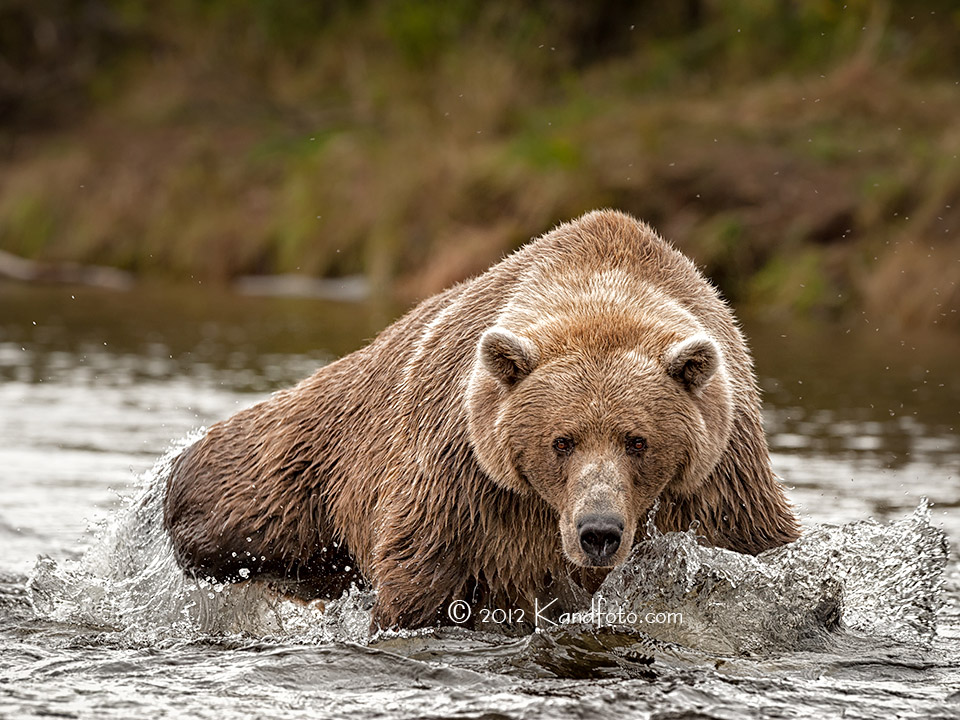





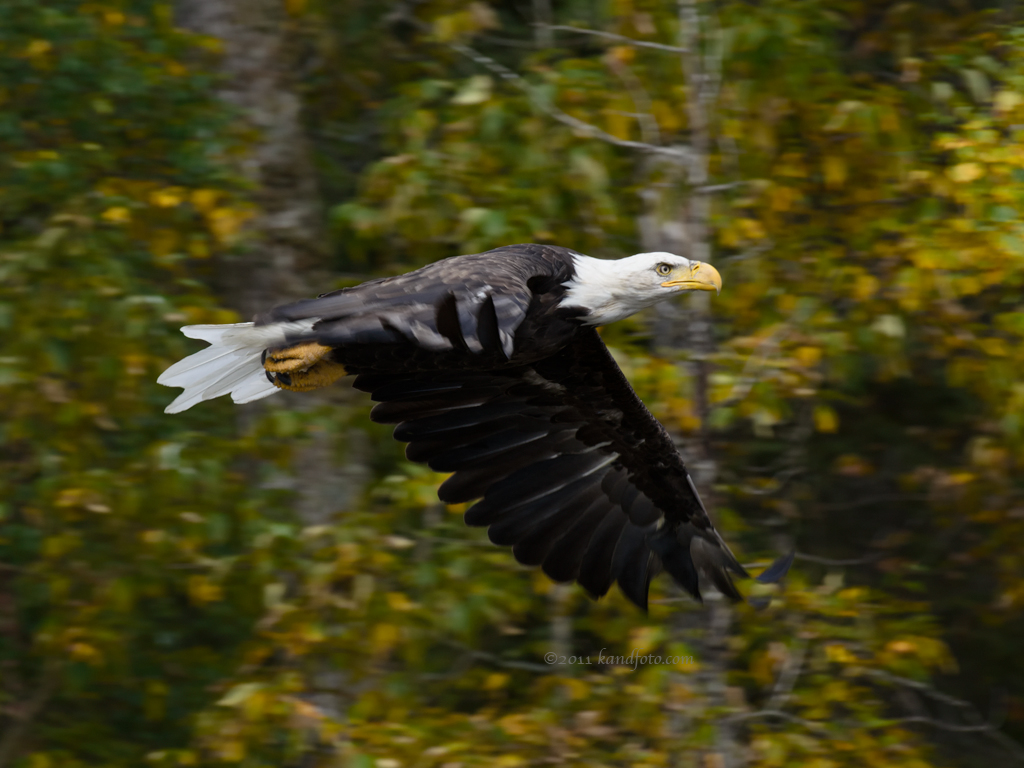
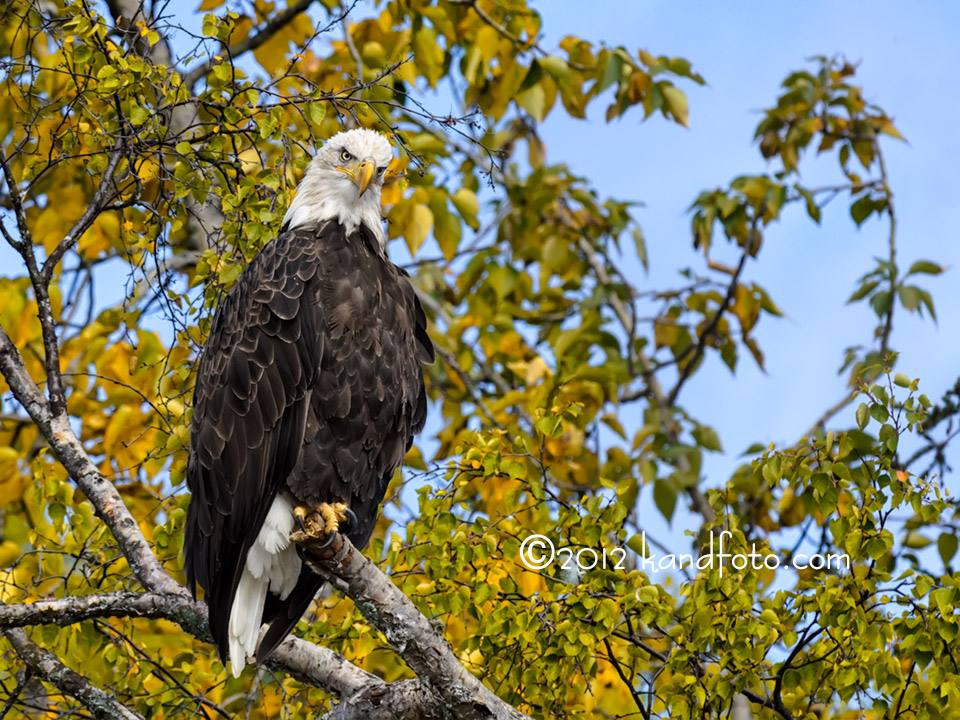
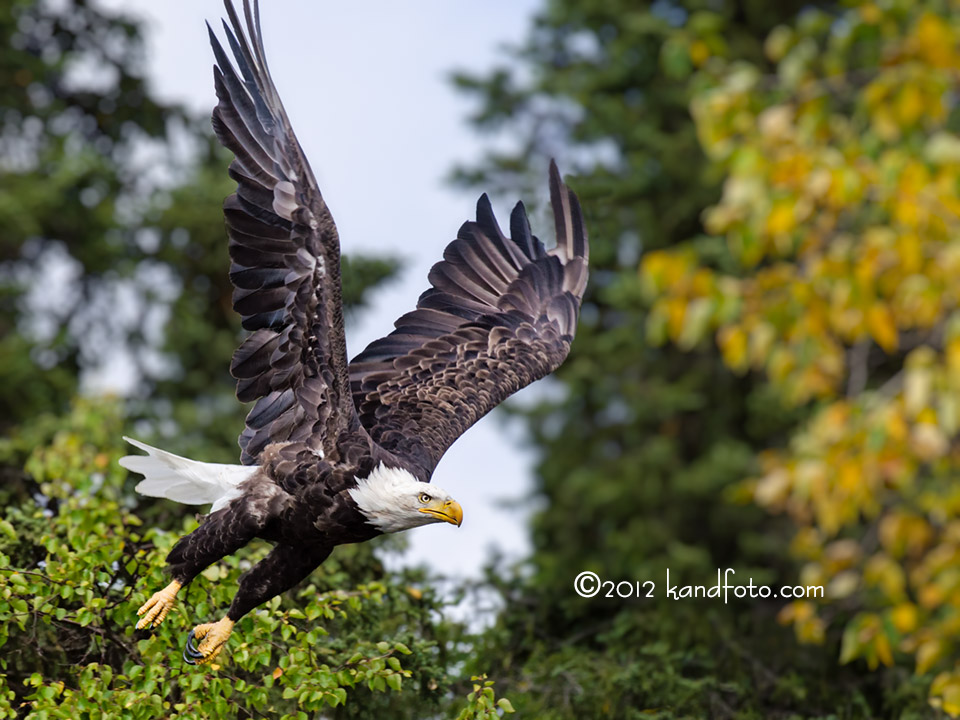
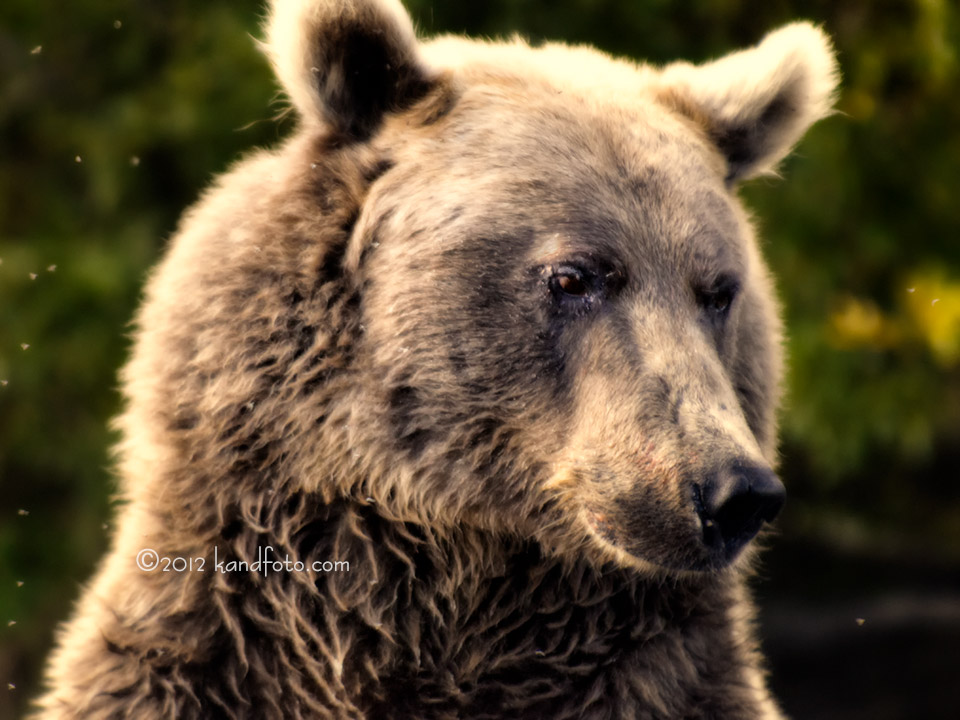
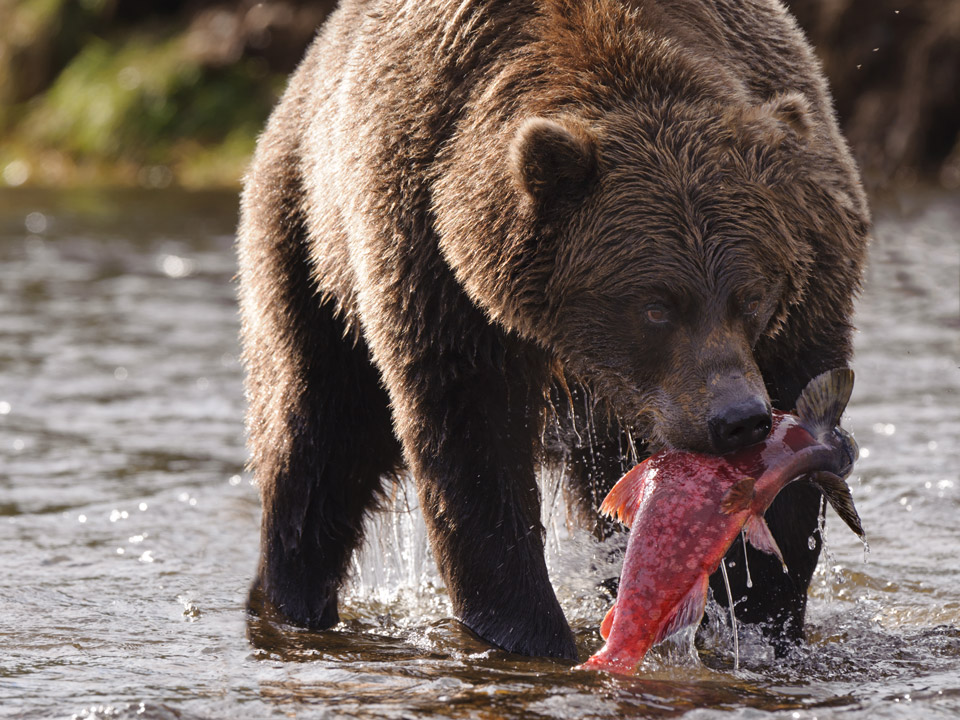
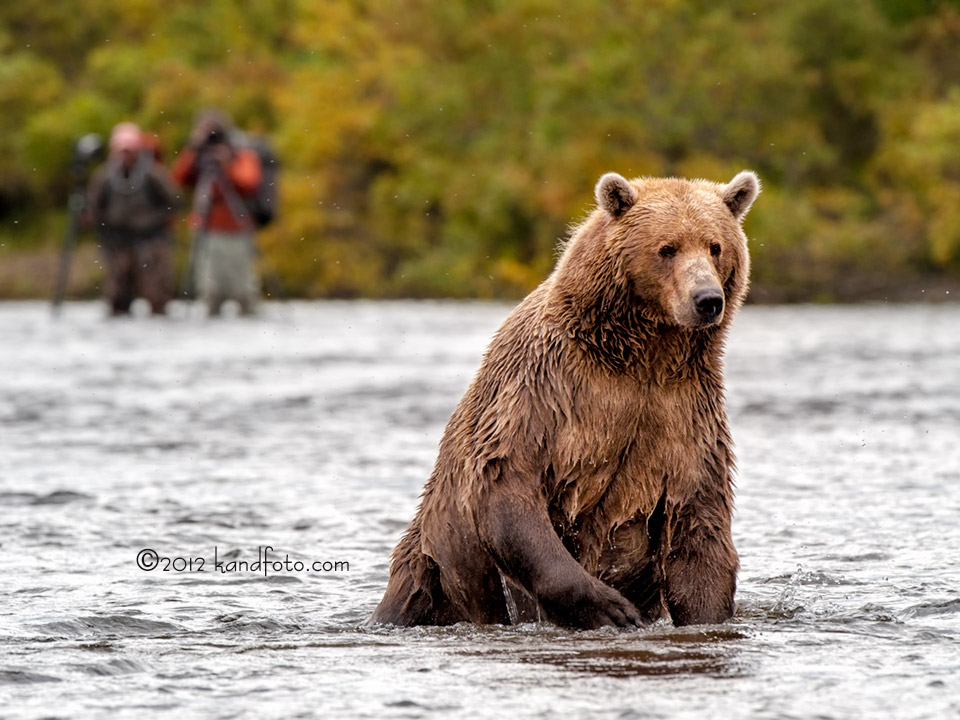
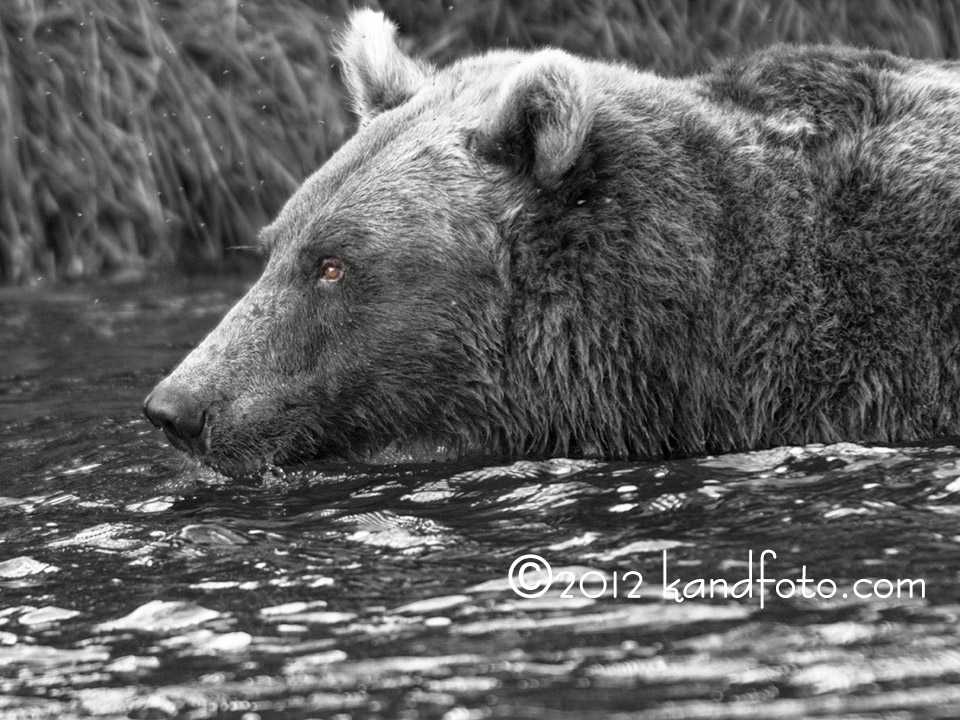

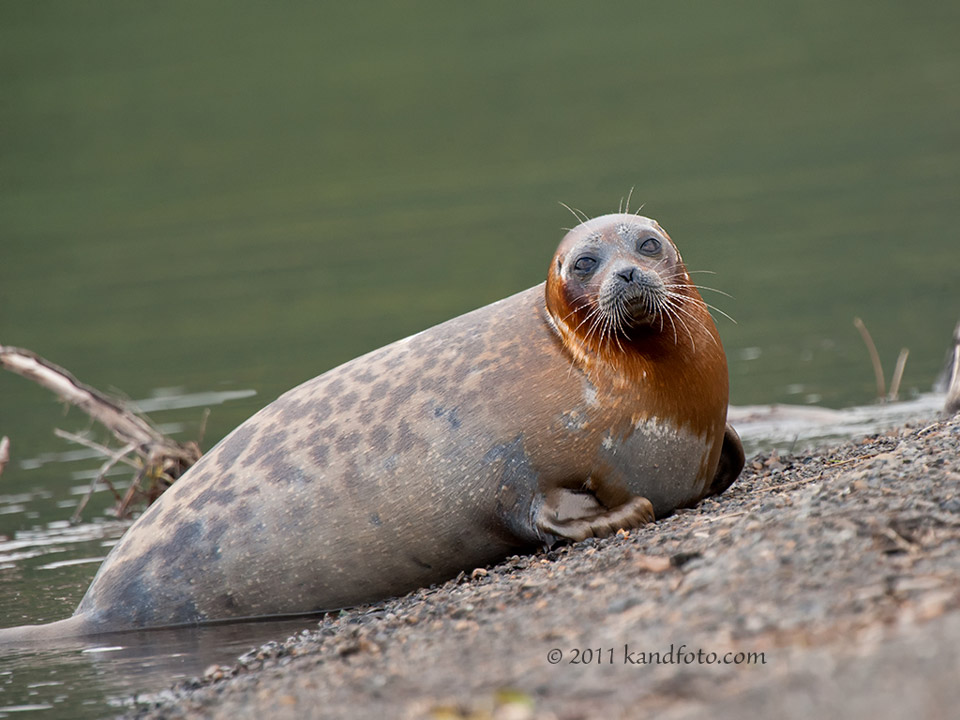
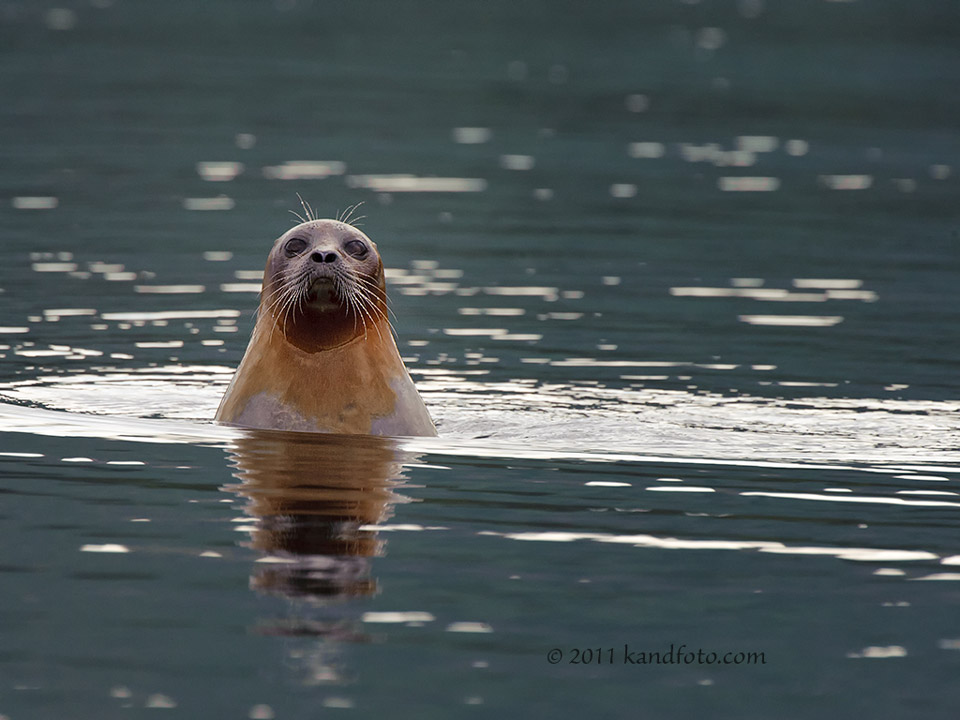
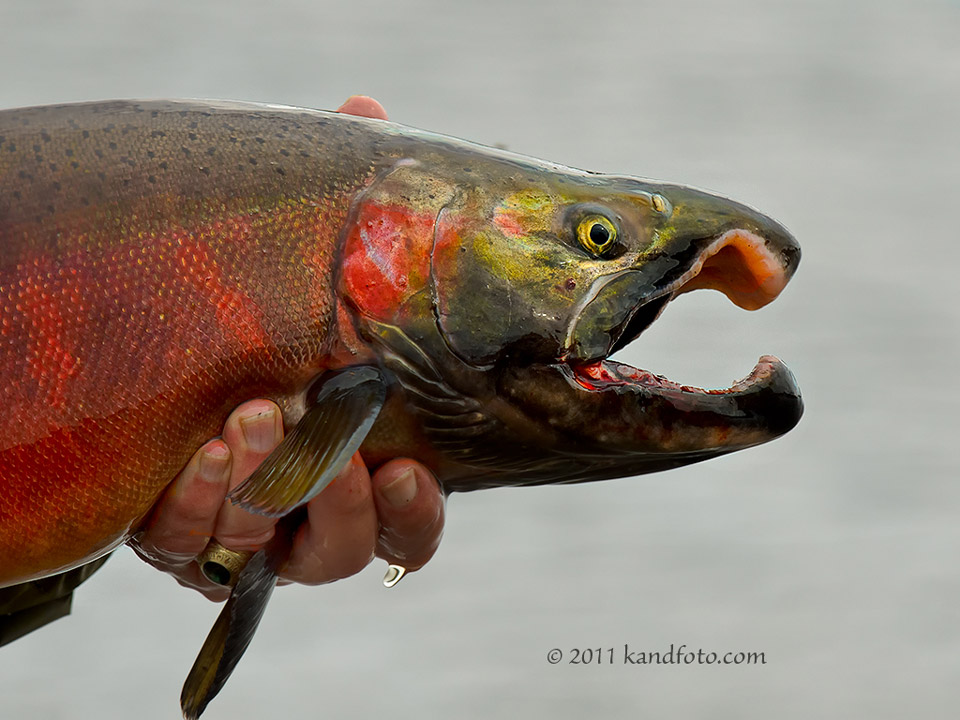

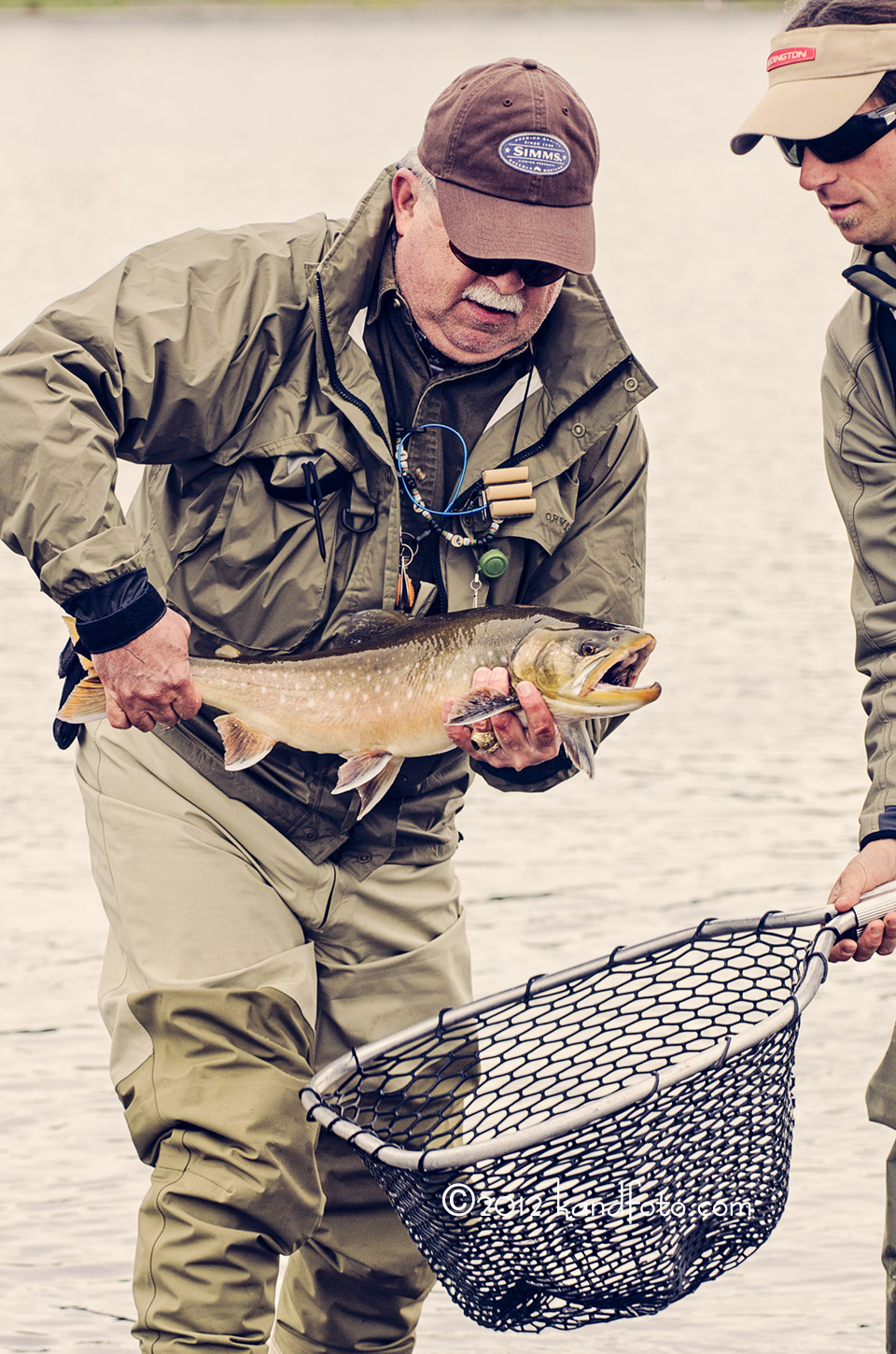
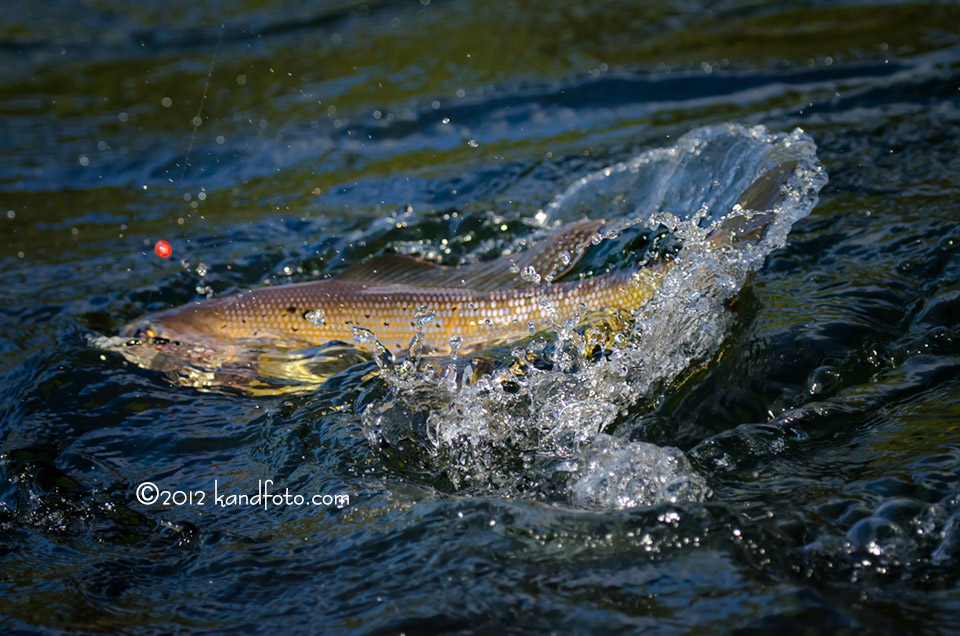


Kandace, I think this is your best blog yet! Your pictures were just beautiful and exciting as well. I’ve been checking this thing almost daily waiting for you to update and you certainly didn’t disappoint. Even old Jim did ok with his addition but he’s no Kandace! Be sure to have all of them on our trip next year.
Ash
I loved what you did with the bear in the water photo. I mean it was a great photo to begin with, but I love the square showing the direct action (in color) and everything around it is in black and white. Cool effect.
I liked the photo in the Bearclaw Lodge on the Aleknagik section. It seemed almost like it was painted on the canvas, but it’s not. The color contrasts and wispy clouds really give it that pop.
And welll, those cute bear cubs…are just so darn cute.
Good job Mom
What a great trip we had. You got some great photos.
Wow! So many great pictures but my favorite is the trees in the fog. Beautiful!
Kandace,
You are so lucky getting to go to Alaska and you certainly made the most of it. The landscapes and wildlife are all beautiful. My favorites are the eagle looking at you from its perch with its head cocked sideways, and the splashing brown bear with the claws showing as it swipes (at a fish I presume) through the water. I think you have a box drawn around it.
Congratulations!
Andrew, thanks for taking the time to write a nice comment. I love your photography, so your comments are so welcomed and cherished. I knew you would like the foggy landscape photo, that is one of my favorites too.
Larry, I always appreciate your comments, especially since I have high respect for your photography skills. The bear you mentioned was really close . . . and when she spotted a fish . . . you could hear her for miles as she exploded into the water.
And, I know you were thinking it . . . no I didn’t see Sarah Palin!
I’ve just made a downpayment for a July 2013 photo tour to Katmai to photograph the bears during the salmon run. I’m already stoked, and reading others’ adventures doing the same whets my photographic appetite even more.